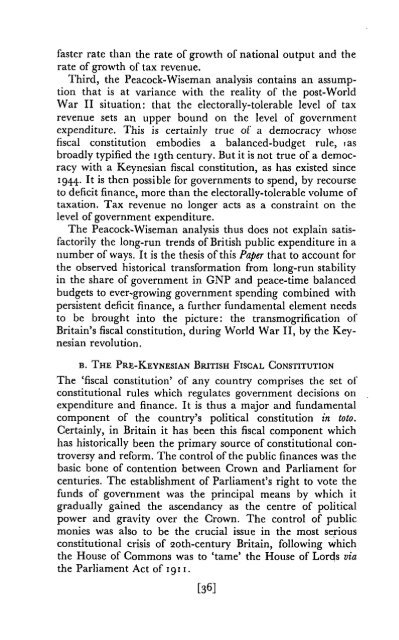THE CONSEQUENCES OF MR KEYNES.pdf - Institute of Economic ...
THE CONSEQUENCES OF MR KEYNES.pdf - Institute of Economic ...
THE CONSEQUENCES OF MR KEYNES.pdf - Institute of Economic ...
Create successful ePaper yourself
Turn your PDF publications into a flip-book with our unique Google optimized e-Paper software.
faster rate than the rate <strong>of</strong> growth <strong>of</strong> national output and the<br />
rate <strong>of</strong> growth <strong>of</strong> tax revenue.<br />
Third, the Peacock-Wiseman analysis contains an assumption<br />
that is at variance with the reality <strong>of</strong> the post-World<br />
War II situation: that the electorally-tolerable level <strong>of</strong> tax<br />
revenue sets an upper bound on the level <strong>of</strong> government<br />
expenditure. This is certainly true <strong>of</strong> a democracy whose<br />
fiscal constitution embodies a balanced-budget rule, ias<br />
broadly typified the 19th century. But it is not true <strong>of</strong> a democracy<br />
with a Keynesian fiscal constitution, as has existed since<br />
1944. It is then possible for governments to spend, by recourse<br />
to deficit finance, more than the electorally-tolerable volume <strong>of</strong><br />
taxation. Tax revenue no longer acts as a constraint on the<br />
level <strong>of</strong> government expenditure.<br />
The Peacock-Wiseman analysis thus does not explain satisfactorily<br />
the long-run trends <strong>of</strong> British public expenditure in a<br />
number <strong>of</strong> ways. It is the thesis <strong>of</strong>this Paper that to account for<br />
the observed historical transformation from long-run stability<br />
in the share <strong>of</strong> government in GNP and peace-time balanced<br />
budgets to ever-growing government spending combined with<br />
persistent deficit finance, a further fundamental element needs<br />
to be brought into the picture: the transmogrification <strong>of</strong><br />
Britain's fiscal constitution, during World War II, by the Keynesian<br />
revolution.<br />
B. <strong>THE</strong> PRE-<strong>KEYNES</strong>IAN BRITISH FISCAL CONSTITUTION<br />
The 'fiscal constitution' <strong>of</strong> any country comprises the set <strong>of</strong><br />
constitutional rules which regulates government decisions on<br />
expenditure and finance. It is thus a major and fundamental<br />
component <strong>of</strong> the country's pohtical constitution in toto.<br />
Certainly, in Britain it has been this fiscal component which<br />
has historically been the primary source <strong>of</strong> constitutional controversy<br />
and reform. The control <strong>of</strong>the public finances was the<br />
basic bone <strong>of</strong> contention between Crown and Parliament for<br />
centuries. The establishment <strong>of</strong> Parliament's right to vote the<br />
funds <strong>of</strong> government was the principal means by which it<br />
gradually gained the ascendancy as the centre <strong>of</strong> political<br />
power and gravity over the Crown. The control <strong>of</strong> public<br />
monies was also to be the crucial issue in the most serious<br />
constitutional crisis <strong>of</strong> 20th-century Britain, following which<br />
the House <strong>of</strong> Commons was to 'tame' the House <strong>of</strong> Lords via<br />
the Parliament Act <strong>of</strong> 1911.<br />
[36]












